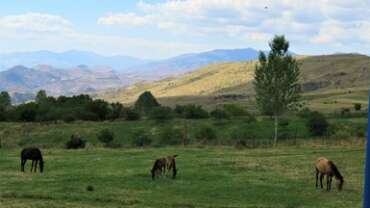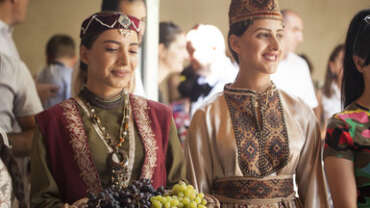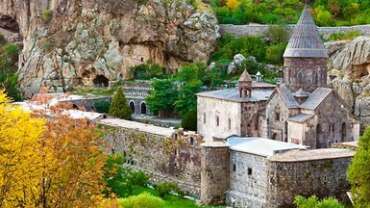Unique Armenian Cuisine!
Armenian food derives most of its magic from the great abundance, quality, and freshness of its locally sourced ingredients. Experiencing Armenia means trying all of the delicious meals it has to offer. Whether it’s in a modern restaurant, a fast food spot, or a traditional home cooked meal – Armenia has many flavors to satisfy your tastebuds.
Cuisine That Has Stood the Test of Time
Armenian cuisine has stood the test of time for two millennia and offers bountiful tables of mouthwatering dishes that are accompanied with intimate drinks and toasts. Here, you will enjoy an inexpensive full dinner at a respectable restaurant, a glass of wine or brandy, and local fruits and berries at the markets fresh from the orchard.
Armenia is a place where recipes are passed on from generation to generation and the signature of specialties become a treasured family secret. It is a place where chefs conjure in the kitchen by keeping to traditional recipes, interpreting or even boldly experimenting with old ones.
Unique qualities of the Armenian Cuisine
Armenian cuisine incorporates fresh and dried herbs in many of the dishes. Often times fresh herbs are used as accompaniments. Certain dishes are filled with spices while the taste of the others mostly relies on freshness of the used ingredients. The old Armenian culinary traditions remain incorporated in the Armenia to this day. Clay kitchenware as well as clay furnaces are actively used by Armenians, adding a unique authentic flavor to the cuisine.
Armenian cuisine is full of many meat based as well as vegetable based dishes. Due to the devotion of the population to the preservation of the Great Lent as well as due to the quantity and quality of the fresh products, Armenian cuisine is very fitting for vegan and lactose intolerant people.
Destination for Food Connoisseurs
You will learn how to bake lavash, make khorovats (barbecue), wrap tolma in grape leaves and learn to distinguish authentic Armenian brandy. You will be offered to taste crayfish with craft beer. A seemingly casual meal, yet in 5th century BC Xenophon, an ancient Greek historian, mentioned in “Anabasis” that the beer he tried in Armenia had excellent taste.
National Geographic included Yerevan in the list of “Six Unexpected Cities for the Food Lovers” mentioning the capital city as one of the best places in Asia with rich cuisine: the magazine advises food lovers to try gastro tours to Armenia.
Armenian Spirits and Beverages
Alcoholic drinks in Armenia have a big cultural and historical significance. Armenians take pride in the local production of drinks such as brandy, wine and oghi (Armenian Vodka), due to its taste, quality and long history. As Armenia grows over 100 varieties of grape, the conditions of the country are ideal for both brandy production and winemaking. Armenian brandy is famous all around the world and is considered one of the best quality and taste wise. The sweetness of the grapes allows for the production of highly alcoholic and strong drinks.
Some other Armenian drinks, such as the mineral water (Jermuk, Bjni, Arzni) so famous around the country, have health benefiting qualities.
Lavash
A very important aspect of Armenian cuisine is the traditional bread in the country. Lavash for Armenians has a sacred meaning and symbolizes well-being, luck, abundance, prosperity.
Armenian bread – lavash is an integral part of Armenian cuisine and culture. Lavash for Armenians has a sacred meaning and symbolizes well-being, luck, abundance, prosperity.
Bread is an ancient and enduring symbol of Armenian heritage, as is tonir (tandoor, oven-roaster) where lavash is traditionally baked. In the Areni cave (where the oldest winery in the world was also found), a tonir dating from the 6th BC. century was discovered. In 2014, lavash was selected for the UNESCO List of the Intangible Cultural Heritage – “Lavash, the preparation, meaning and appearance of traditional bread as an expression of culture in Armenia”. In November 2019, CNN included Armenian lavash in the list of 50 best breads in the world.
The process of making lavash has also been documented in countless paintings. In the 1970s, the 38th president of the United States, Gerald Ford, even chose the work of the artist Manuel Tolegyan, “Armenian women bake lavash bread” for the White House collection.
Many Armenian traditions, legends and signs are associated with lavash.According to the legend, it was lavash that kept St. Gregory the Illuminator alive for 13 years of imprisonment. Thanks to his apostolate Armenia became the first country in the world to adopt Christianity as a state religion. According to the wedding tradition of Armenians the newlyweds’ shoulders are covered with lavash when they enter the house, which symbolizes well-being and fertility for the new family.
The basic recipe for lavash is very simple – flour, water and salt. However, time-consuming and complex making and baking process makes it unique, tasty and durable. Another distinguishing feature of lavash is its versatility – you can wrap food in it or eat it separately. Quite spectacular is a khash eating ritual. Khash is traditional Armenian dish (soup) cooked by boiling calves’ hooves . The process of preparing and eating this dish is accompanied by many rituals, and one of them is associated with lavash. Traditionally, khash is eaten with hands – dry lavash is crushed into the broth and covered with a large piece of lavash. So, khash covered with lavash remains hot for a long time. Then by using a piece of lavash you can eat broth, lavash serving as a spoon.
Traditionally, only women bake lavash. Perhaps, this also has a sacred meaning, since a woman in Armenian culture is the guardian of the household. The baking process requires special skills, experience and efforts. First, dough is prepared, which is divided into small balls. Then they are rolled into thin layers and pulled on an oval pillow. After the pillow is lowered into the tonir and slapped on the wall. After some time, a cripsy bread is drawn from there. The layers can be laid down, covered and stored for a long time. To restore softness, just spray it with some water.
Armenian Wine & Spirits
As a country famous for its brandy and cognac, Armenia remains in a leading position in the international market.
Armenian Wine
Armenia is one of the oldest wine making regions in the world and wine is an ancient part of its culture. Armenian wines provide something for every occasion and in every form, from delicate whites to robust reds to wonderful dry or sweet sparkling wines, and from simple table wines to some of the most expensive and sought.
Armenia is a country of century-old traditions of winemaking the founder of which is considered to be a biblical patriarch who planted the first vine at the foot of Mountain Ararat. The traditions of ancient winemakers are properly preserved by modern winemakers. Thus, it is no surprise that the terroir of Vayots Dzor produces wine that is included in top ten best wines in the world according to Bloomberg Business weekly. Specifically, the “Zorah Karasi Areni Noir” from an endemic type of grape of 2012 harvest that is aged in clay vessels.
If you enjoy wine bars, make sure to walk along Saryan Street. There are plenty of hip and well-decorated wine bars for you to choose from!
The Legendary Brandy
Armenian brandy is renowned worldwide (winner of several awards), and was considered by the late British Prime Minister, Sir Winston Churchill, as his favorite. The generous sun of the Ararat Valley, the fertile land, and the quality of water gives the Armenian brandy its gold color and extraordinary taste.
Beer
The most popular Armenian beers are Kotayk and Kilikia. Recently, there are more microbreweries opening around Yerevan that serve draft beer.
10 Armenian Must-Try Dishes
There is no shortage of interesting and tasty food for you to try in Armenia. Anything from traditional Armenian dishes, to classics with a modern twist as well as a big choice of international cuisines, is available for you. Finding delicious food here will never be a problem.
It is difficult to imagine a visit to Armenia without feasting on some traditional Armenian cuisine. In fact, gaining a few kilos during your trip is pretty much inevitable, however, everybody who has visited Armenia would guarantee you that discovering this exquisite cuisine is well worth the little extra weight.
You will not regret it, that’s for sure!
Finding a place to have Armenian food is not a hard task. You have a wide array of restaurants, cafes as well as food delivery services to choose from. But note that the traditional Armenian dishes are not all that Yerevan has to offer, the city also allows you to take your pick from international cuisines such as Chinese, Japanese, Mexican, Italian, Syrian, Lebanese and more.
Now let’s focus on the Armenian specialties that will make your taste buds so delighted that you will certainly want to come back for more!
1. Khorovats, or the Armenian barbecue
There is no family gathering or occasion in Armenia without the famous khorovats. Apart from having a distinctive taste that is different from any other barbecue or stake, khorovats is considered to be a quintessential part of the Armenian legacy. The art of making khorovats is passed from one generation to the next and usually fathers teach their sons the techniques of a well executed khorovats. There is even an annual festival of khorovats held in September, in Akhtala, Tavush region!
2. Tolma
Tolma consists of meat, rice, and onion rolled up in fresh young grape leaves. This Armenian food is often eaten with matzoon (fermented milk) mixed with some garlic. No New Year’s Eve feast is ever complete without a plate of Tolma at the center of the table.
3. Armenian Lavash
Lavash is a common type of bread in Armenia that both locals and foreigners are very fond of. It is a soft, thin, unleavened flatbread made in a tandoor. The lavash-making process is an inseparable part of the Armenian culture and cuisine. For the record, lavash, together with its preparation, meaning and appearance of traditional bread is included in UNESCO’s List of the Intangible Cultural Heritage of Humanity as an expression of culture in Armenia.
4. Harissa
Harissa is a thick porridge made from cracked wheat and fat-rich meat, usually chicken or lamb. The long cooking process, usually around 5 hours, is an essential part of the tradition. Harissa too has its own festival celebrated in September, in Musaler, not far from Yerevan.
5. Spas
Spas is the all-time favorite soup for all Armenians. It is a yogurt soup filled with peeled wheat and greens. This white soup is finger licking tasty!
6. Zhingyalov hats
Zhingyalov hats is a type of flatbread stuffed with herbs and green vegetables. Although you can find it in Yerevan too, this is the traditional dish of Nagorno-Karabakh. If you are in Armenia, and happen to be travelling to Karabakh, eating zhingyalov hats is a must.
7. Khash
Before going to the sweets, the strangest but also most loved food, or rather breakfast, in Armenia is khash. The dish consists of boiled beef feet, and locals like to eat it with dried lavash and accompany it with some vodka. Reuniting around a table of khash is such a warm and comforting tradition.
8. Gata
After all these tasty dishes, it sure feels like it is time for some dessert. Gata is an Armenian pastry consisting of sweet bread. It can take a variety of shapes, sizes and its decorated versions are very aesthetically pleasing. Having become a well known national symbol, Gata is usually one of the top things that tourists look for. There is also a tradition of putting a coin inside gata before baking it, and the finder will have a good fortune. Tourists usually buy gata near Geghard monastery, a top tourist destination in Armenia.
9. Sweet Sujukh
This Armenian dessert decorates all the markets in Yerevan. It will most definitely catch your eye during your visit to the fairs or any touristic destination in Armenia. It is a tasty dessert made of walnuts in thickened grape juice. Also, many tourists take sujukh from Armenia as a souvenir for their loved ones back home.
10. Pakhlava
Last but not least, pakhlava is a dessert pastry made of layers of filo filled with chopped nuts and stuffed with lots of honey. As you may have noticed, Armenia is full of good food, but nothing can beat the taste of Pakhlava, a pure pleasure for the senses!








